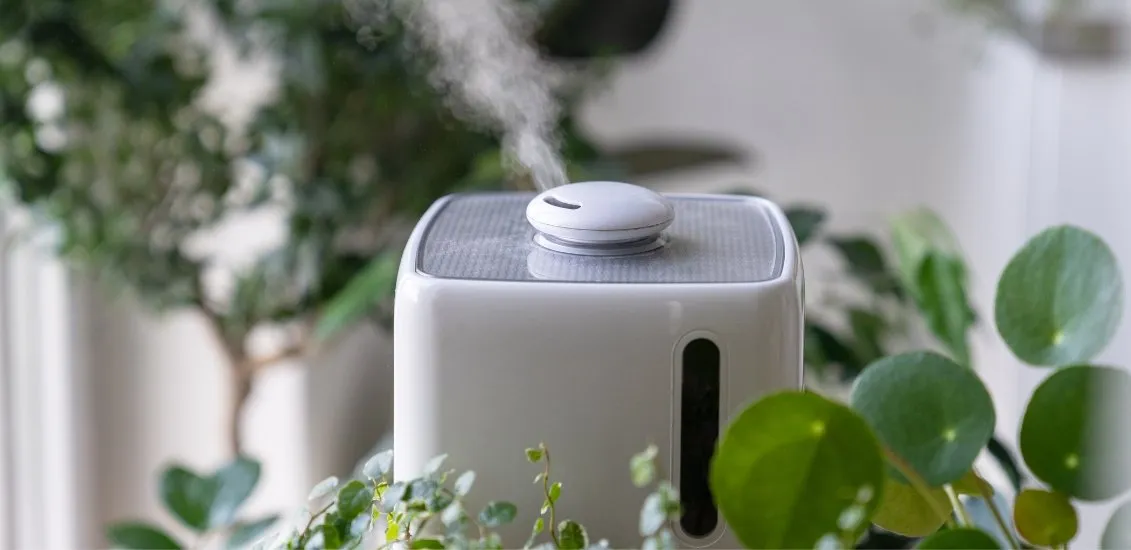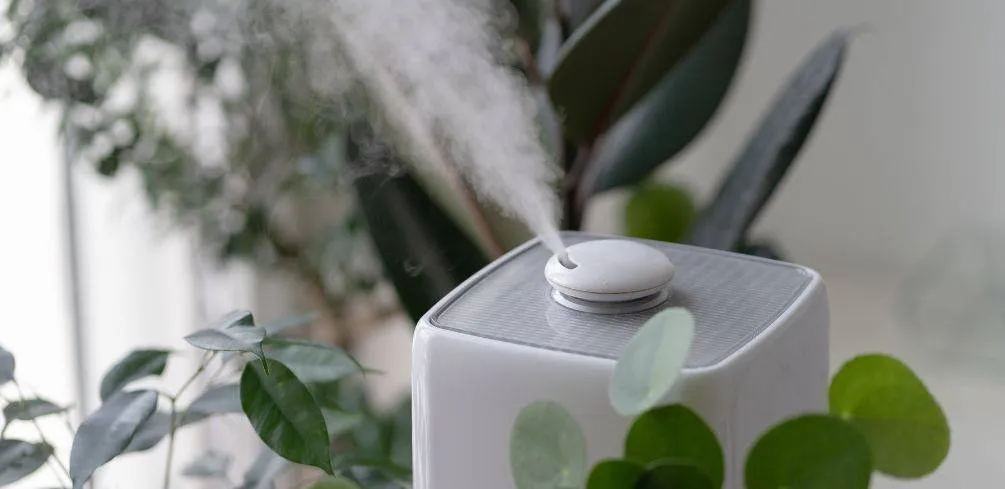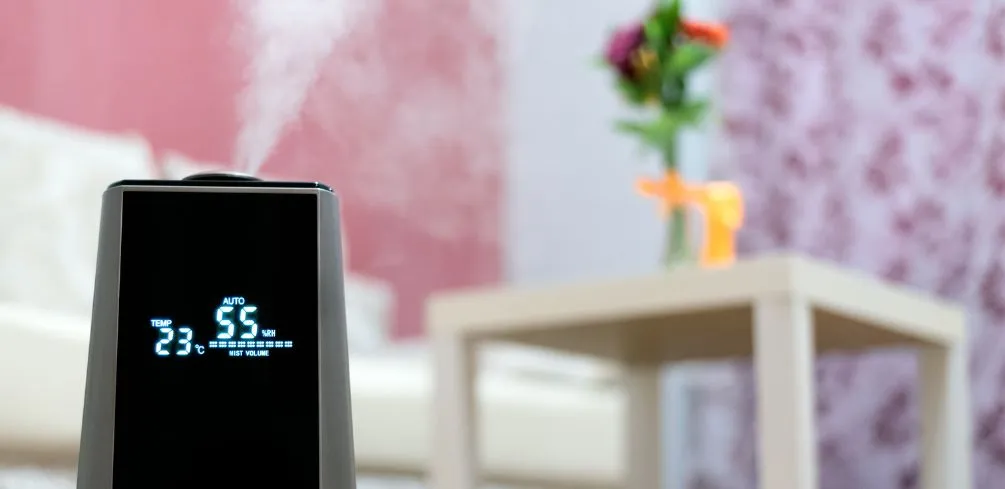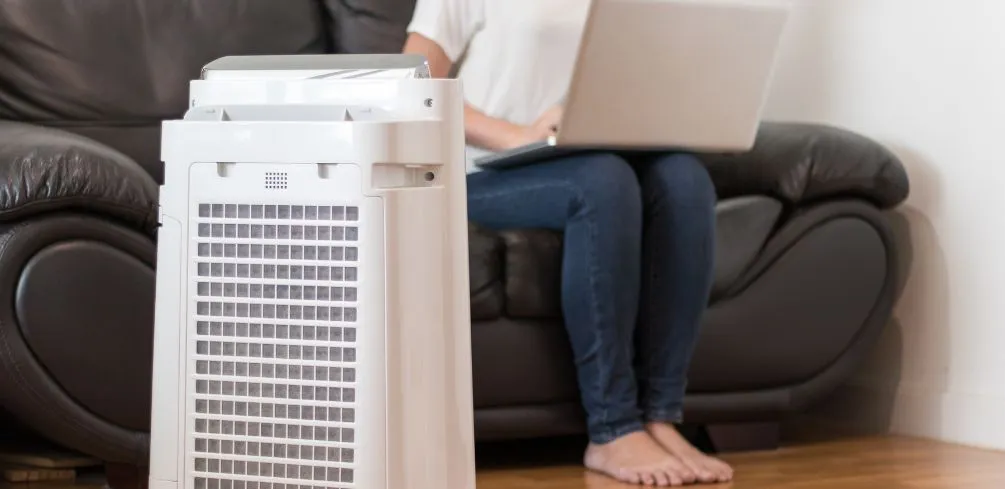Does a humidifier make room warmer? It’s an important question to ask when deciding whether or not you should invest in one for your home.
Many people believe that increasing the humidity of a room will result in it feeling warmer, but is this actually true?
In this blog post, we’ll look at how humidifiers work and answer the question, “does humidifier make room warmer?” We’ll also provide some tips on using them effectively if you decide they are right for you as well as alternatives to consider before investing in one. Read on to learn more!
Humidifier Basics
What is a Humidifier?
A humidifier is an appliance that adds moisture to the air in your home. It works by releasing water vapor into the air, which helps keep your indoor environment comfortable and healthy.
There are several types of humidifiers available, including evaporative, ultrasonic, impeller, and steam models. Each type has its own advantages and disadvantages depending on what you need it for.
Types of Humidifiers
Evaporative humidifiers use a fan to draw air through a wet filter or wick that absorbs moisture from the water tank before blowing it out into the room as cool mist. Ultrasonic humidifiers create mist using high-frequency sound waves that vibrate tiny metal diaphragms inside the unit’s reservoir.
Impeller models use rotating discs to disperse droplets of water into the air while steam units boil water until it turns into vapor before releasing it into your living space.
Benefits of Using a Humidifier
Using a humidifier can help reduce dryness in your home caused by central heating systems or cold winter weather outside. This added humidity can make breathing easier for those with allergies or asthma, as dry air can irritate these conditions even more than normal levels do.
Furthermore, increased humidity levels also reduce static electricity buildup in carpets and furniture, as well as prevent wood floors from cracking due to low moisture content over time.
Does a Humidifier Make Room Warmer?
Humidifiers are a great way to add moisture to the air in your home, but can they also be used to heat up a room? The answer is yes and no.
While humidifiers do not directly increase the temperature of a room, they can make it feel warmer by increasing the humidity level. Meaning the room temperature itself will stay the same.
How Does a Humidifier Affect Temperature?
When you use a humidifier, it adds water vapor into the air, which increases its relative humidity. This means that even though the actual temperature remains unchanged, it will feel warmer because higher levels of humidity make us more sensitive to heat.
In other words, when there is more moisture in the air our bodies perceive this as an increase in temperature even if thermometers don’t show any change. Humidifiers eject water droplets into the air and can boost air quality as long as they are properly maintained.
If they are not well kept, this can cause the air quality to degrade, causing respiratory problems in the human body.
Factors That Impact The Temperature Change:
The amount of warmth you experience from using a humidifier depends on several factors such as how much water vapor is being added into the air and what type of material your walls and furniture are made out of. For example, if your walls or furniture contain materials like wood or stone then these will absorb some of that extra moisture, making them feel cooler than usual. At the same time, lighter materials like plastic may retain more heat, making them feel warmer than normal.
Additionally, larger rooms with high ceilings tend to take longer for their temperatures to rise compared to smaller ones due to their greater volume and surface area, respectively, so keep this in mind when deciding whether or not you should invest in one for heating purposes.
Pros And Cons Of Using A Humidifier To Heat A Room:
One advantage of using a humidifier for heating purposes is that it does not require any additional energy source since all you need is tap water, making it cost-effective compared to electric space heaters or furnaces, which consume electricity and gas. However, one downside is that too much humidity can cause mold growth inside your home. Make sure you monitor its levels regularly with hygrometers (devices used for measuring relative humidity).
Furthermore, depending on where you live, certain types of humidifiers may be illegal due to safety concerns; therefore, check local regulations before purchasing one, just in case.
Takeaway: Humidifiers can make a room feel warmer without changing the temperature. The amount of warmth you experience depends on factors such as how much water vapor is being added, what materials your walls and furniture are made out of, and the size of the room. Benefits include cost-effectiveness since no additional energy source is required but it’s important to monitor humidity levels regularly to prevent mold growth. Lastly, check local regulations before purchasing a humidifier for heating purposes.
Tips for Using a Humidifier to Heat Your Room
Choosing the Right Size and Type of Humidifier for Your Room: When selecting a humidifier to heat your room, it is important to choose one that is the right size and type for your space.
If you have a large room, you may need an evaporative or steam humidifier. These types of units are more powerful than ultrasonic models and can add moisture to larger spaces quickly.
On the other hand, if you have a smaller area, such as a bedroom or office, an ultrasonic model may be sufficient. Additionally, when choosing between different models within each type of humidifier, consider factors such as noise level and energy efficiency ratings to find one that best fits your needs.
Setting Up the Humidifier in the Right Place in Your Room: Once you’ve chosen the right size and type of humidifier for your space, it’s time to set up the unit correctly in order to get the maximum benefit from its use.
For optimal performance, place your humidifier near windows or vents where air circulates freely throughout the room. This will help ensure that humidity levels remain consistent throughout all areas of your home or office instead of concentrating only in certain spots.
Also, make sure there is enough clearance around any furniture pieces so that air can move freely without obstruction from walls or objects blocking airflow paths.
It is important to maintain proper levels of moisture in your room for the full benefit of using a humidifier. To do this, regularly check humidity readings with an indoor hygrometer or an app on your smartphone designed for this purpose.
Most experts recommend keeping relative humidity levels between 30-50%, depending on personal preference. If the levels become too high, mold growth could be an issue, and additional steps, such as cleaning out any standing water present inside tanks/reservoirs associated with some types of humidifiers before continuing usage again safely after drying completely first, may be necessary.
Takeaway: When choosing a humidifier to heat your room, it is important to select one that is the right size and type for your space. Additionally, make sure to place the unit near windows or vents so air can circulate freely throughout the room. Lastly, use an indoor hygrometer or app on your smartphone regularly to check humidity levels and keep them between 30-50%.
Alternatives to Using a Humidifier to Heat Your Room
Electric heaters are a great alternative to using a humidifier to heat your room using one temperature increases, instead of humidity. They provide an efficient and cost-effective way of heating up any space quickly and easily.
Electric heaters come in many different sizes, shapes, and styles, so you can find one that fits your needs perfectly. Some electric heaters have adjustable thermostats, which allow you to set the temperature for maximum comfort.
Additionally, some models even feature safety features such as overheat protection or automatic shutoff if they become too hot.
Space heaters are an alternative option for heating a room without using a humidifier. These devices use convection technology to circulate warm air throughout the area, making them suitable for small spaces such as bedrooms or offices where humidity levels may be low.
Space heaters come in various sizes and designs, so you can choose one that fits your needs and budget. Additionally, most models offer adjustable thermostats so you can customize the temperature settings for optimal comfort within the space being heated.
Takeaway: Using a humidifier to heat your room can be an effective and efficient way to keep your space warm, but it is important to consider the size of the unit, its placement in the room, and how often you maintain proper levels of moisture. Additionally electric or space heaters may provide more consistent results than relying solely on a humidifier due to their ability to produce direct warmth. Key Takeaway: -Humidifiers can help make home warmer during cold winter months -Size and placement of unit are important factors when considering using one as a heater -Electric or space heaters may provide more consistent heating results
FAQs in Relation to Does Humidifier Make Room Warmer
Conclusion
Using a humidifier to heat your room can be an effective and efficient way to keep your space warm. However, it is essential to consider the size of the humidifier you choose, where you place it in the room, and how often you maintain proper levels of moisture for it to be successful.
When using a humidifier as a heater, temperature changes will depend on several factors, such as the type of unit used, its placement within the room, and whether or not there are any other sources of heat present. Generally speaking, if all conditions are met correctly then humidity levels should increase by 1-2 degrees Celsius with each 10% increase in relative humidity.
This means that if your starting relative humidity were 40%, increasing this level by 10% would result in an approximate 2-degree Celsius rise in temperature.
It is also important to note that while using a humidifier may help make your home warmer during cold winter months, electric or space heaters may still be necessary, depending on how cold temperatures get outside. Additionally, these alternative heating methods may provide more consistent results than relying solely on a humidifier due to their ability to produce direct warmth rather than just raising ambient air temperatures slightly through increased moisture content alone.
In conclusion, when considering whether or not using a humidifier will effectively warm up your home environment, it is important to take into account various factors, such as what type of unit you use and where it is placed within the room, along with any other existing sources of heat present before making any decisions about which method works best for you personally.
Please be careful and use at your own risk
None of the authors, contributors, administrators, or anyone else connected with Wild Fog, in any way whatsoever, can be responsible for your use of the information contained in or linked from these web pages.










